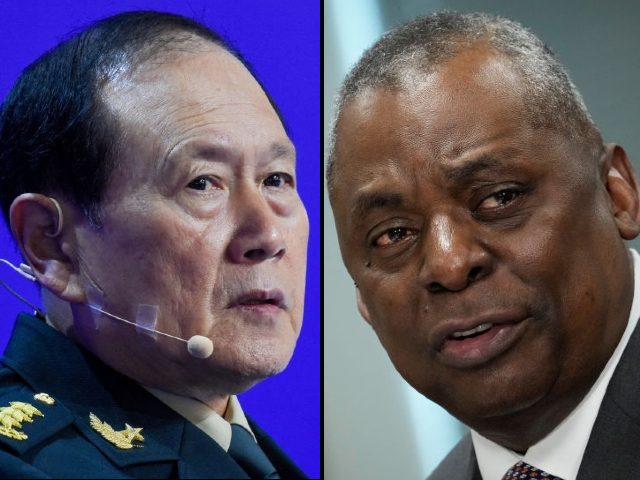Defense Secretary Lloyd Austin and Chinese Defense Minister Gen. Wei Fenghe traded warnings surrounding Taiwan over the weekend even after a one-on-one meeting that was meant to reduce tensions.
The two men met Saturday, June 11, 2022, for the first time during the Biden administration at the annual security forum Shangri-La Dialogue in Singapore. The meeting lasted a little less than an hour, with most of it spent on Taiwan, according to an official Defense Department report.
Officials said they saw the lines of communications between Austin and Wei as “guardrails to keep both sides from veering off the road toward escalation.” An official anticipated “additional open military channels from the chairman of the Joint Chiefs of Staff to his counterpart.”
Austin spelled out U.S. policy towards Taiwan — the U.S. acknowledges there is “one” China, but it does not support unilateral changes to the status quo between China and Taiwan and will maintain its commitment to providing Taiwan with support to resist a Chinese military invasion.
Defense Secretary Lloyd Austin meets with Chinese Defense Minister Gen. Wei Fenghe on the fringe of the Shangri-La Dialogue. The two looked to increase communication between the competitors to lessen chances of miscalculation. #IISS #SLD22 pic.twitter.com/pLQ7q1HMtt
— James A. Garamone (@GaramoneDODNews) June 11, 2022
However, Austin also issued a public warning to Beijing during his address at the Shangri-La Dialogue on Friday evening.
“We’ll also stand by our friends as they uphold their rights,” Austin said. “That’s especially important as the [People’s Republic of China] adopts a more coercive and aggressive approach to its territorial claims.”
Austin outlined China’s aggressive and destabilizing behaviors towards its neighbors in the East China Sea and South China Sea, as well as “within the territorial waters of other Indo-Pacific countries.” Farther to the west, Beijing is hardening its position along its border with India, he said.
“You know, Indo-Pacific countries shouldn’t face political intimidation, economic coercion, or harassment by maritime militias. So the Department of Defense will maintain our active presence across the Indo-Pacific. We will continue to support the 2016 Arbitral Tribunal ruling. And we will fly, sail, and operate wherever international law allows. And we’ll do this right alongside our partners,” Austin said.
Austin also criticized China for “an alarming increase” in the number of unsafe aerial intercepts and confrontations at sea by Chinese aircraft and vessels.
He said the U.S. did not seek confrontation, conflict, a new Cold War, an Asian NATO, or a region split into hostile blocs. However, he added, “We will defend our interests without flinching.”
The next day, Wei gave a blistering response.
Lashing out at Austin, Wei rejecting his “smearing accusation” that China was causing regional instability regarding Taiwan. He accused the U.S. of bullying others in the region, not China.
“No country should impose its will on others or bully others under the guise of multilateralism,” Wei said, according to the Associated Press. “The strategy is an attempt to build an exclusive small group in the name of a free and open Indo-Pacific to hijack countries in our region and target one specific country — it is a strategy to create conflict and confrontation to contain and encircle others.”
Wei accused the U.S. of “meddling in the affairs of our region” with U.S. naval patrols, and “flexing the muscles by sending warships and warplanes on a rampage in the South China Sea.”
He also accused the U.S. of not adhering to the One-China policy, saying “it keeps playing the Taiwan card against China.”
Wei warned that China would “definitely” realize its goal to reunify with Taiwan. China sees Taiwan as a rogue Chinese province, whereas Taiwan sees itself as a separate country.
“China’s reunification is a great cause of the Chinese nation, and it is a historical trend that no one and no force can stop,” he said, adding that China would “resolutely crush any attempt to pursue Taiwan independence.”
“We will not hesitate to fight, we will fight at all costs and we will fight to the very end,” he said. “This is the only choice for China.”
As Breitbart News reported, 30 Chinese People’s Liberation Army Air Force (PLAAF) aircraft recently flew into Taiwan’s air defense identification zone (ADIZ) in the second-largest military aircraft incursion of the year, which included two Su-35 fighters for the first time in at least several years.
Follow Breitbart News’s Kristina Wong on Twitter or on Facebook.

COMMENTS
Please let us know if you're having issues with commenting.